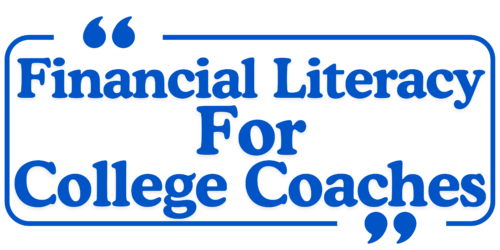Curriculum: Tax Literacy for Coaches
This curriculum aims to enhance coaches’ understanding of tax laws, implications, and strategies related to their income, benefits, and overall financial planning. Coaches will learn how to effectively manage their taxes, optimize their financial situations, and remain compliant with tax regulations.
Module 1: Introduction to Tax Literacy
Learning Objectives:
- Understand the importance of tax literacy for financial planning.
- Familiarize yourself with key tax terminology and concepts.
- Recognize the various types of taxes that may affect coaches.
Topics Covered:
- What is Tax Literacy? The Importance for Coaches
- Key Tax Terminology: Understanding Basic Concepts
- Types of Taxes: Income Tax, Self-Employment Tax, Property Tax, and More
- The Tax Filing Process: An Overview of Requirements and Deadlines
Module 2: Understanding Income Tax
Learning Objectives:
- Learn how income tax is calculated and applied to different income sources.
- Understand the difference between earned and unearned income.
- Explore tax brackets and marginal tax rates.
Topics Covered:
- How Income Tax Works: An Overview of the Tax System
- Earned vs. Unearned Income: What You Need to Know
- Tax Brackets and Marginal Rates: Understanding Your Tax Burden
- Deductions and Credits: Reducing Your Tax Liability
Module 3: Tax Deductions and Credits for Coaches
Learning Objectives:
- Identify available tax deductions and credits specific to coaches.
- Learn how to maximize deductions to reduce taxable income.
- Understand the importance of keeping accurate records for tax purposes.
Topics Covered:
- Common Tax Deductions for Coaches: Travel, Equipment, and Education
- Tax Credits vs. Deductions: Understanding the Differences
- The Importance of Record-Keeping: Receipts and Documentation
- Strategies for Maximizing Deductions and Credits
Module 4: Self-Employment and Business Taxes
Learning Objectives:
- Understand tax implications for coaches working as self-employed individuals or business owners.
- Learn about estimated tax payments and self-employment tax.
- Familiarize yourself with the concept of pass-through entities and business structures.
Topics Covered:
- Tax Implications of Self-Employment: What Coaches Need to Know
- Estimated Taxes: How to Calculate and Pay Them
- Self-Employment Tax: What It Is and How It Affects You
- Business Structures: LLCs, S-Corps, and Tax Considerations
Module 5: Tax Planning Strategies
Learning Objectives:
- Develop effective tax planning strategies to minimize tax liabilities.
- Learn how to use retirement accounts for tax benefits.
- Explore timing strategies for income and expenses.
Topics Covered:
- The Importance of Tax Planning: An Overview
- Using Retirement Accounts: 401(k)s, IRAs, and Tax Advantages
- Timing Income and Expenses: Strategies for Tax Efficiency
- Other Tax Planning Strategies: Charitable Contributions and Investments
Module 6: Navigating State and Local Taxes
Learning Objectives:
- Understand the differences between federal, state, and local taxes.
- Learn how state tax laws can impact coaches and their income.
- Explore the importance of tax residency and implications.
Topics Covered:
- Federal vs. State vs. Local Taxes: Key Differences
- Understanding State Income Tax: Rates and Regulations
- Tax Residency: What It Means and Why It Matters
- Local Taxes: Sales Tax, Property Tax, and Their Impacts
Module 7: Preparing for Tax Season
Learning Objectives:
- Learn how to prepare for tax season and gather necessary documents.
- Understand the process of filing taxes and choosing the right tax software or professional help.
- Explore strategies for filing taxes efficiently.
Topics Covered:
- Preparing for Tax Season: Key Documents and Deadlines
- Filing Taxes: Choosing Software vs. Hiring a Professional
- Common Mistakes to Avoid When Filing Taxes
- Tax Filing Options: E-Filing, Paper Filing, and Extensions
Module 8: Final Assessment and Tax Strategy Development
Final Assessment: Participants will develop a personalized tax strategy plan, considering their income, deductions, and financial goals.
Certification: Upon completion, participants will receive a certification in Tax Literacy for Coaches, empowering them to navigate their tax responsibilities confidently and effectively.
This Tax Literacy curriculum provides coaches with essential knowledge and tools to manage their taxes efficiently, optimize their financial outcomes, and ensure compliance with tax regulations.
